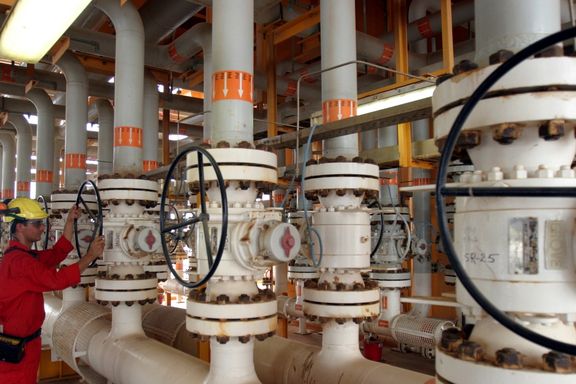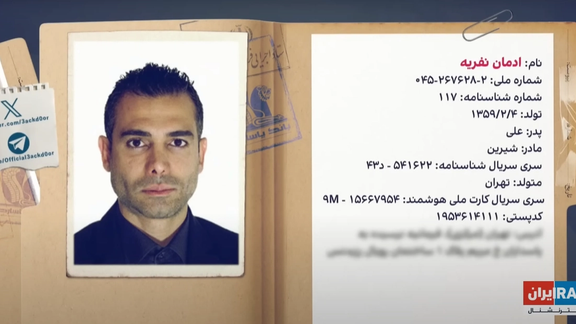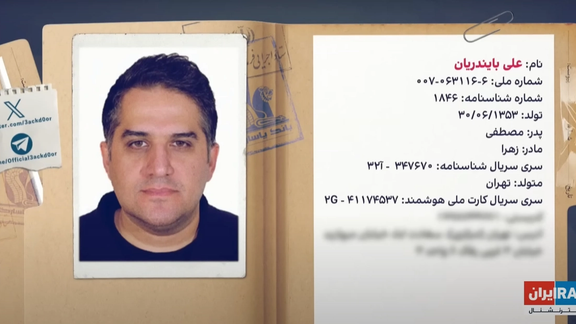Hackers Leak Details About Iran's Shadowy Oil Smuggling Network

Iran International has obtained information about two oil smugglers, helping to circumvent US sanctions, affiliated with top officials close to Iran's Supreme Leader Ali Khamenei.

Iran International has obtained information about two oil smugglers, helping to circumvent US sanctions, affiliated with top officials close to Iran's Supreme Leader Ali Khamenei.
The two, Edman Nafrieh (Adman Nafariyeh) and Ali Bayandarian, collaborated with Parsargad Bank to sell millions of dollars' worth of Iranian oil illegally, a common practice for the Islamic Republic meant to circumvent the US sanctions on its oil industry and banking sector.
The operation allegedly took place under the auspices of the Headquarters of Imam's Directive (Executive Headquarters of Imam's Order or simply Setad), a parastatal organization under direct control of the Supreme Leader. A committee known as the "Cover Committee," which includes key figures of Iran’s Supreme National Security Council purportedly issued credit lines to intermediaries for bypassing sanctions.

The Islamic Republic has numerous mechanisms in place through a wide range of entities and organizations to sell its oil via third parties to evade sanctions. The country has also started giving oil to state organizations, including the IRGC, as a way to boost their budgets without actually allocating any money to them. Such operations are usually carried out by a network of state bodies and businesspeople with close ties to the regime, who usually gain huge profits in the process. However, with every new administration in office, former assets become a liability and bear the brunt of the political games of the regime.
Edman Nafrieh, 43, who lives in an upmarket part of Tehran, is one of such businesspeople who were trusted by the Setad to sell Iranian oil. His real name, Arman, was changed to Adman in 2007 and later to Adrian, as he gradually whitewashed his Iranian origins. Finally in January last year, he changed his last name to Touran to complete his more Western cover image. Through a network of companies active in the field of energy in Tehran and Dubai, Nafrieh is still active in illegal sales of Iran’s oil as well as bitumen industry.
In one case in 2019, two senior figures of the cover committee – Yahya Alavi and Mohammad Mirmohammadi -- requested Parsargad Bank to issue a $500 million bank guarantee in the name of Nafrieh to sell the oil, which was under the control of the Setad. Apparently, he never paid back about $300 million of the oil sale proceeds.
He was designated by the US in November 2022 along with five other people and 17 entities in a crackdown on a sanctions evasion network that provided support to Iran’s proxy in Lebanon Hezbollah and the Islamic Revolutionary Guard Corps-Qods Force (IRGC-QF).
Ali Bayandarian, another member of the Setad’s oil smuggling network, was also sanctioned by the US in January 2020 as Washington designated four companies accused of purchasing Iranian oil and petrochemical products. Bayandarian was designated over his links to the companies.

Documents leaked by a cyberattack on the Iranian parliament’s media arm on Tuesday revealed the parliament's coordination with designated Iranian entities and individuals to facilitate their trade activities and conceal their identities and connections from international regulatory bodies.
Nafrieh and Bayandarian are just small cogs in Iran’s huge network in charge of keeping the flow of oil revenues around global sanctions.
Iran’s oil exports have been increasing in recent years, from a low of less than 500,000 barrels per day after the US re-imposed sanctions on Iran in 2019 to as high as over 1,500,000, a rise that regime officials attribute to measures to bypass the punitive measures rather than an honest interaction with the world.
One of the most well-known cases was former tycoon Babak Zanjani, who now faces execution for embezzling the proceeds of oil sales totaling around $3.5 billion. Zanjani was arrested and convicted in 2013 after Hassan Rouhani was elected president, but has always maintained his innocence and that the death sentence passed was "politically motivated."
Zanjani sold Iranian oil on behalf of the NIOC during President Mahmoud Ahmadinejad's second term (2009-13) through an elaborate network of black-market dealers and money-launderers − particularly in the UAE, Turkey and Malaysia. He was subsequently sanctioned by the Council of the European Union in December 2012 and by the United States Treasury in April 2013.